It’s that time of the year again. SwimSwam will be previewing the top 12 men’s and women’s teams (and then some) from the 2022 NCAA Championships. Follow along with the College Swimming Preview Channel. Want to read even more? Check out the latest edition of the SwimSwam magazine.
NOTE: Although the Florida women were not ranked in the top 12 at NCAAs last year, we felt it was necessary to do a preview on them as new additions make them heavily favored to improve a significant amount from their 2021-22 ranking.
#13 Florida Gators
Key Losses: Vanessa Pearl (3-time NCAA qualifier, medically retired), Rosie Zavaros (32 SEC points)
Key Additions: Emma Weyant (transfer — distance free/IM), Caroline Pennington (transfer — distance free/IM), #9 Zoe Dixon (VA — IM/back), #12 Hayden Miller (TX — distance)
Fifth Years: Nina Kucheran (transfer — breast)
GRADING CRITERIA
Two years ago, we unveiled a new, more data-based grading criteria based on ‘projected returning points’, a stat of our own making that involved a lot of manual calculations involving departing seniors, redshirts, freshmen, etc. We liked the objectiveness of that stat, but given that there’s still a lot of uncertainty for this year, we’re adopting a hybrid approach this year. The “stars” will rely heavily on what swimmers actually did last year, but we’ll also give credit to returning swimmers or freshmen who have times that would have scored last year.
Since we only profile the top 12 teams in this format, our grades are designed with that range in mind. In the grand scheme of college swimming and compared to all other college programs, top 12 NCAA programs would pretty much all grade well across the board. But in the interest of making these previews informative, our grading scale is tough – designed to show the tiers between the good stroke groups, the great ones, and the 2015 Texas fly group types.
- 5 star (★★★★★) – a rare, elite NCAA group projected to score 25+ points per event
- 4 star (★★★★) – a very, very good NCAA group projected to score 15-24 points per event
- 3 star (★★★) – a good NCAA group projected to score 5-14 points per event
- 2 star (★★) – a solid NCAA group projected to score 1-4 points per event
- 1 star (★) – an NCAA group that is projected to score no points per event, though that doesn’t mean it’s without potential scorers – they’ll just need to leapfrog some swimmers ahead of them to do it
We’ll grade each event discipline: sprint free (which we define to include all the relay-distance freestyle events, so 50, 100 and 200), distance free, IM, breaststroke, backstroke, butterfly and diving. Use these grades as a jumping-off point for discussion, rather than a reason to be angry.
2021-22 LOOKBACK
While there was a ton of buzz surrounding Florida’s #3-ranked men’s team and their pro group, which gained Katie Ledecky around the time that the college season started, the Gators women’s team began their first season under head coach Anthony Nesty in a relatively quiet manner. They got through dual meets, mid-season invites, and conferences without much spotlight, finishing fifth at SECs after being runners-up in 2021. Coming into NCAAs, they were projected to finish 25th and score 16 points. However, that did not happen.
On the first day of NCAAs, the Gators pulled off a shocker by finishing sixth in the 800 free relay after being seeded 15th. That trend continued throughout the meet, as their 17th-seeded 200 free relay finished ninth and their 12th-seeded 400 free relay finished eighth. Individually, swimmers and divers like Tylor Mathieu, Mabel Zavaros, and Talia Bates had big swims to get points on the board. In the end, the Gators finished 13th with 115 points, making the biggest jump from their seed out of any team in the NCAA.
SPRINT FREE: ★★★

Talia Bates (photo: Jack Spitser)
In the wake of the team’s distance dominance, the Florida women’s sprint group gets a bit overlooked. However, they have a lot of stars up their sleeve, as shown through their sixth and seventh-place finishes in the 800 and 400 free relays respectively at the 2022 NCAAs.
Individually, the team is led by Talia Bates, who scored six points at NCAAs. She placed 16th in the 100 free with a time of 47.95 and 12th in the 200 free at 1:44.47, and she also has a personal best of 22.01 in the 50 free which is just 0.02 seconds off a berth in the NCAA ‘B’ final. Bates’ best time of 1:43.28 in the 200 free, which she swam to finish second at the 2021 NCAAs, would have placed fifth in the 2022 version of the meet.
The second prominent sprinter on this Gators team is Ekaterina Nikonova, who has been as fast as 22.16/48.05/1:44.83. She was just off of finaling at NCAAs, finishing 18th in the 100 free in 48.24 and 17th in the 200 free in 1:45.05, although her best times both would have made the ‘B’ final.
In addition to Bates and Nikonova, the Gators have a few mainstrays on their relays with the ability to make an individual impact. One of them is Katie Mack, who has the potential to become the team’s best 50 freestyler since Natalie Hinds. Her season-bests in the 50 and 100 free last year were 22.33 and 49.79, but her best time of 21.82 in the 50 from 2021 shows potential. She also split 21.65/47.79 on the freestlye relays at NCAAs last year, which is an indication that she can be much faster than her flat start times from the 2021-22 season.
In fact, Mack just went 49.65 at Florida’s recent dual meet against Arkansas (which is faster than her 2021-22 season best), a sign that she’s in for a rebound year.
There’s also Micayla Cronk, who split 21.82/47.57/1:44.56 on the NCAA freestyle relays as a freshman last year. She was a relay-only swimmer at that meet, but this year could be her chance to break out individually.
DISTANCE FREE: ★★★★★
With their new additions, the Gators have arguably the best distance freestyle group in the country.
Let’s start off with the returners: Tylor Mathieu and Elise Bauer, who led the team in distance last year. Mathieu had a huge NCAA meet last year, setting best times of 4:38.62 and 16:03.73 to finish 11th and 12th respectively in the 500 and 1650 free. She’s got a good shot at making the 500 free ‘A’ final this year considering that she was ninth in the 2022 prelims and three out of the eight 2022 ‘A’ finalists aren’t returning. In addition, she’s also coming off an appearance at the Duel in the Pool this summer, which will give her the boost of international experience headed into the NCAA season.
In the mile, Bauer hit a personal best of 16:06.48 in the NCAA prelims to finish 17th, just 0.36 seconds away from scoring. She also finished 33rd in the 500 free with a 4:44.56, although her best time of 4:40.82 that she clocked at SECs would have placed 17th at NCAA prelims, again on the cusp of scoring.

Emma Weyant (photo: Jack Spitser)
The biggest gain that the Gators are going to get in distance free is Emma Weyant, who transferred from Virginia to Florida and is the pre-season favorite to win the NCAA title in the 500 free. Last season, she dropped three seconds in the event, which eventually culminated in her putting up a 4:34.99 to finish second at NCAAs. The only two swimmers who were fast than her last season were Lia Thomas and Emma Nordin, so with both of them graduated, Weyant comes into this season as the woman to beat. She’s also been as fast as 16:02.51 in the 1650 free, giving her another event to help the Gators put points up on the board.
Hayden Miller is the best freshman miler in the country, and her best time of 16:02.22 would have been 10th at NCAAs. She also goes 4:40.66 in the 500 free, which is yet again another NCAA-scoring time. 2022 Pac-12 champion Caroline Pennington will also be a huge addition, as she brings in a personal best time of 15:48.69 which puts her in a rare category of women in the NCAA who have been sub-15;50 in the mile.
If every single Gator mentioned in this category fires on all cylinders at NCAAs, they could be scoring over 100 points just from the 500 and 1650 free events—hence why distance free is going to be a key proponent as to why Florida will see a fast rise this year.
BACKSTROKE:★★

Mabel Zavaros (photo: Jack Spitser)
The 100 back is a weak point for the Gators, as they had no NCAA qualifiers in the event last year. Talia Bates swims backstroke on the medley relays and her SECs leadoff time of 52.49 was the fastest 100 back time on the team last year, but she’s likely not going to race the event individually. The next two fastest 100 backstrokers on the team last year were Katie Minnich (53.21) and Rosie Zavaros (53.62), who were both over a second off NCAA qualification.
However, there’s a lot of budding potential in the 200 back.
Rosie Zavaros, now graduated, was Florida’s only swimmer that raced in both individual backstroke events at SECs, finishing 24th in the 100 back and 10th in the 200 back with a time of 1:54.56. That mark was the second-fastest on her team, just behind her sister Mabel Zavaros‘ season-best of 1:53.63 that she clocked at NCAAs to finish 20th. Zavaros’ NCAA performance was actually her first time under 1:54-point since 2018 (when she set her PB of 1:53.10), and it could indicate that she’s primed for a breakthrough after years of plateau.
The Gators also gain freshman Zoe Dixon, who has been as fast as 1:53.82 in the event. It took a 1:53.27 to make the 200 back ‘B’ final at NCAAs, so all Mabel Zavaros and Dixon need to do is drop a few tenths and the team could have two 200 back scorers at NCAAs this year compared to none last year.
BREASTROKE: ★★
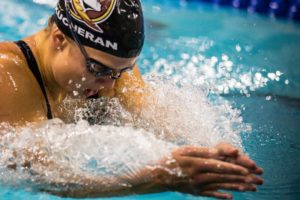
Nina Kucheran (photo: Jack Spitser)
In 2021-22, Florida’s breaststroke was a major, major weakness. With season-bests of 1:00.17/2:14.17, Tylor Mathieu was the fastest breaststroker on the team and swam the stroke in the 400 medley relay. I’ll repeat it again: a distance freestyler was this team’s top breaststroker.
That shouldn’t be a problem this year, thanks to the addition of fifth-year Florida State transfer Nina Kucheran. The Canadian native finished 22nd in the 100 breast (59.53) and 28th in the 200 breast (2:09.23) at NCAAs last year, although if she hit her personal bests of 59.02/2:08.57, she would have been tied for 13th in the 100 breast ‘B’ final and just 0.43 seconds away from a second swim in the 200 breast. Kucheran’s potential to put points up on the board and free Mathieu of relay duties will be a major boost for the Gators.
Florida’s only SEC breaststroke scorer last season was Olivia Peoples, who was 21st in the 100 breast with a time of 1:01.07 and has also been as fast as 2:14.87 in the 200 breast. She’ll have to drop a significant amount of time to earn an NCAAs berth, though.
BUTTERFLY: ★
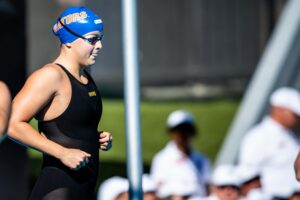
Amanda Ray (photo: Jack Spitser)
Butterly is the discipline where the Gators have the least projected scorers this season. Olivia Peoples, the team’s fly representative in the 400 medley relay and the fastest 100 flyer on the team, has a best time of 52.49. She didn’t qualify individually for NCAAs, although her PB was just 0.14 seconds off the cutline last season.
The next fastest Gator in the 100 fly is Talia Bates, who went 53.08 at the Georgia Tech Invite, but the chances of her touching the event at a big meet are really bleak.
In the 200 fly, the Gators are significantly stronger, considering that they had two NCAA qualifiers. Amanda Ray clocked 1:55.53 to finish third at SECs, and then went on to place 24th at NCAAs in 1:55.51. However, she did set a best time of 1:54.83 at the 2022 Bulldog Invite, which would have been fast enough to tie for 16th in NCAA prelims. If she can get back down to that time this season, the Gators could potentially see a couple of butterfly points.
The second NCAA qualifier in the 200 fly was Mabel Zavaros, who went a personal best of 1:56.31 to finish 32nd at NCAAs and was also 14th at SECs. However, this race is simply a “filler” third event for her, and her abilities in it pale in comparison to her strength in the 200 back or 400 IM.
Florida’s third SECs finalist in the 200 fly was Allie Piccirillo, who was 19th in 1:57.78. However, her best time of 1:56.70 from the 2020 SECs is just a few tenths away from NCAA qualification.
Zoe Dixon brings in fly times of 53.83/1:56.21, but she’s probably going to be put to use in other events.
IM: ★★★
The Florida IM group is interesting because while there’s not much starpower in the 200 IM, the 400 IM is STACKED for this team-hence why the latter event is single-handedly bringing this category rating to three stars.
In the 200 IM, the fastest swimmer coming in is Zoe Dixon, who has a best time of 1:56.29. It took a 1:55.90 to make the ‘B’ final at NCAAs, so she’s getting pretty close. Kathleen Golding was the team’s only NCAA qualifier and SECs finalist in the event last year, having finished 37th at nationals in a time of 1:57.50. So in other words, the 200 IM is an event with scoring potential for the Gators, but its nowhere near where they are in the 400 IM.
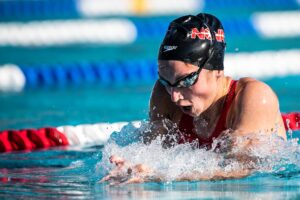
Zoe Dixon (photo: Jack Spitser)
So let’s talk about this Gators’ 400 IM squad. This year, they will be led by Emma Weyant, the 2020 Olympic silver medalist in the event. She finished fourth at NCAAs in a time of 4:03.17, and would have been fast enough to finish second at SECs. Then there’s Mabel Zavaros, who was seeded 18th coming into NCAAs but jumped to finish sixth in 4:06.22 (although she went 4:04.43 in prelims). And don’t forget about Dixon, whose best event is arguably the 400 IM considering that her PB of 4:06.43 would have ‘B’ finaled at NCAAs last year and is less than a second away from making the championship heat.
Golding is another sub-4:10 400 IMer, holding a best time of 4:09.36 that’s less than a second away from reaching the NCAA ‘B’ final. Anna Auld has also been as fast as 4:11.02, having set that time to finish 1tth at SECs. She finished 40th at NCAAs in 4:15.09, but her SECs time would have moved her up to 26th.
With this team having three potential ‘A” finalists at NCAAs, the Gators could be scoring 50+ points solely from the 400 IM.
DIVING: ★★★
Florida’s diving gets three stars because the team’s top scorer at NCAAs last year was, in fact, a diver. Maha Amer was seventh on 1-meter and 12th on 3-meter, racking up a total of 17 points. She also scored 67 SEC points, just two less than the point total of the team’s top scorer, Tylor Mathieu. The team also added Italian World Juniors medalist Elettra Neroni in January last season, and although she didn’t go to NCAAs, she made an immediate impact by finishing seventh on platform, 15th on 1-meter, and 16th on 3-meter to score 46 points at SECs—the fifth most on the team.
The Gators’ second NCAA diving qualifier last year was Carina Lumia, who was 51st on 3-meter.
RELAYS: ★★★
Relays are a bit of a mixed bag for Florida. While their free relays are all strong and capable of scoring at NCAAs, their weaknesses in sprint back, breast, and fly make their prospects of medley relay success very low. In fact, they didn’t even qualify a 200 medley relay for NCAAs and finished outside the top eight at SECs.
With Ekaterina Nikonova, Talia Bates, Katie Mack, and Micayla Cronk all returning, Florida’s 200 and 400 free relays (which finished ninth and seventh, respectively, at NCAAs and both dropped over a second off their SEC times) are in good shape. With top-eight teams in the 200 free relay like Missouri and Michigan losing big pieces such as Sarah Thompson and Maggie MacNeil, the Gators could see themselves getting on the podium this season for that race.
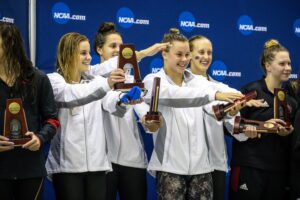
Florida Women 800 Free Relay (photo: Jack Spitser)
The 800 free relay was Florida’s strongest relay last year, as they finished sixth at NCAAs in the race and dropped nearly four seconds off their SEC time. Bates (1:43.87), Nikonova (1:43.81), Cronk (1:44.56), and Tylor Mathieu (1:44.72) already make up a strong quartet, but there’s a chance that one of them could be replaced by Emma Weyant, who split 1:44.80 on UVA’s relay last year and has been as fast as 1:45.28 off a flat start. Her times are similar to some of Florida’s current relay members, so it really comes down to who is fastest during championship season.
Now let’s discuss those medley relays. And while the Gators aren’t really strong in these races, their 400 medley relay has the potential to be improved due to the addition of Nina Kucheran. If you swap out Tylor Mathieu‘s 1:00.14 breaststroke split for Kucheran’s 58.78 in the same race at NCAAs, Florida’s final time would have added up to 3:31.67 instead of 3:33.03. That would have moved them up to 20th instead of 21st at NCAAs, which is not that much, but a 1.36-second advantage is still better than nothing.
But even with Kucheran, that 200 medley relay still doesn’t have much promise. Last year, Florida’s 200 medley relay finished 10th at SECs in 1:37.78, which is 0.76 seconds away from the NCAA ‘B’ cut for the event. Replacing Mathieu’s 27.74 breast split with Kucheran’s 27.28 from NCAAs last year would improve their overall time by a few tenths and put them into the top eight at SECs, but it still wouldn’t qualify the team for NCAAs. That being said, they will be closer than they were before.
In conclusion, Florida is a team that had and will continue to have great success in freestyle relays (hence the “University of Freestyle” nickname), but their medley relays still need a lot of work.
Total Stars: 22/40
2022-23 Outlook
The Florida Gators are the fastest-rising women’s team in the NCAA. Their recruiting class (which includes transfers) was ranked #3 in the NCAA right behind Virginia and Stanford, which is huge for a team that didn’t even finish in the top 12 last year. Nina Kucheran fills a hole in breaststroke, while additions like Emma Weyant, Caroline Pennington, Hayden Miller, and Zoe Dixon will make the team one of the best distance free and 400 IM programs in the country.
Considering that their HUGE group of class of 2023 recruits doesn’t come until next season, the Gators are still a few years away from hitting their maximum potential. However, they still gain a LOT this year and don’t lose much, so we predict that they will overtake many teams such as Michigan, Cal, Indiana, and Kentucky and move into the top 10—capping out at potentially eighth or ninth. We also believe they can move up from fifth at SECs to finish third behind Tennessee and Alabama (as Georgia and Kentucky, the two teams that beat Florida, are both losing a lot of big pieces).
That being said, Florida is going to be reliant on its freestylers and IMers for the majority of their points. Their lack of back/breast/fly depth is going to hold them back from entering the top six or so teams this season, especially since strength in the stroke races is what gives a team crucial medley relay points. In addition, Weyant and Pennington haven’t been cleared to compete yet, so they must do so by championship season in order for Florida to see the full impact of its newcomers.
There’s still a long way to go to the top, but expect the Gators to get better and better every season.
WOMEN’S PREVIEW INDEX
| Team | Sprint Free | Distance Free | Backstroke | Breaststroke | Butterfly | IM | Diving | Relays | Total Stars |
| #1 Virginia Cavaliers | ★★★★★ | ★★★ | ★★★★ | ★★★★★ | ★★★★★ | ★★★★★ | ★ | ★★★★★ | 33/40 |
| #2 Texas Longhorns | ★★ | ★★★★ | ★★★ | ★★★★ | ★★★★★ | ★★ | ★★★★★ | ★★★ | 28/40 |
| #3 Stanford Cardinal | ★★★★ | ★★★ | ★★★★★ | ★★ | ★★★★★ | ★★★ | ★ | ★★★★★ | 28/40 |
| #4 Alabama Crimson Tide | ★★★★★ | ★★★ | ★★★★ | ★★★ | ★★ | ★ | ★ | ★★★★ | 23/40 |
| #5 NC State Wolfpack | ★★★★ | ★ | ★★★★ | ★★★ | ★★★ | ★★ | ★ | ★★★★ | 22/40 |
| #6 Louisville Cardinals | ★★★ | ★★★ | ★★ | ★ | ★★★★ | ★★★ | ★★ | ★★★★ | 22/40 |
| #7 Michigan Wolverines | ★★★ | ★★ | ★ | ★★ | ★ | ★★ | ★ | ★★★ | 15/40 |
| #8 California Golden Bears | ★ | ★ | ★★★ | ★ | ★★★ | ★★★ | ★ | ★★★ | 16/40 |
| #9 Ohio State Buckeyes | ★★★ | ★★★ | ★★ | ★★★ | ★★ | ★★ | ★★★ | ★★★★ | 22/40 |
| #10 Tennessee Volunteers | ★★★ | ★★★★ | ★★★ | ★★★ | ★★★ | ★★★★ | ★ | ★★★ | 24/40 |
| #11 Indiana Hoosiers | ★★ | ★★ | ★ | ★★★ | ★ | ★★ | ★★★★ | ★ | 16/40 |
| #12 Kentucky Wildcats | ★ | ★ | ★★ | ★★★ | ★★ | ★★★ | ★★ | ★★ | 16/40 |
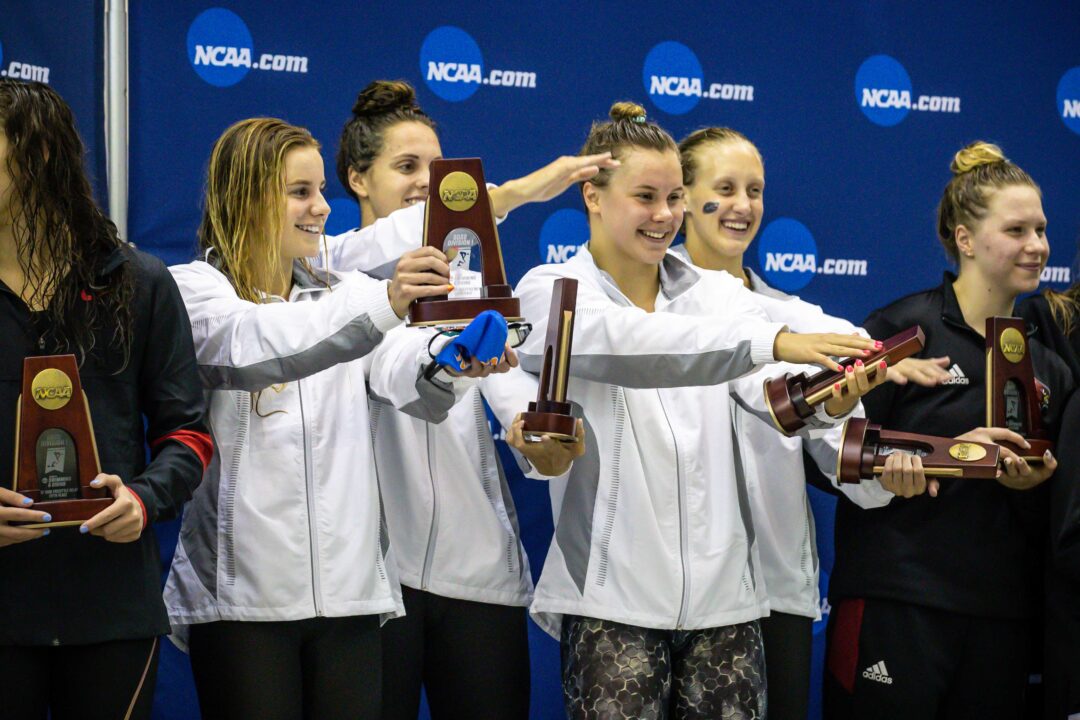
Any insight why Steve Jungbluth is no longer listed as a coach on UF website?
Is Weyant definitely expected to be able to swim for UF this season?
Anna Auld (16:14) and Leah Degeorge (16:15) both offer huge potential in the distance events. Auld came off of a 7th place finish at the World Championships in the 25K, and Degeorge was 5th in the 5K at OW Nats in 2022. Both are huge stars as well that I think deserve a mention in distance free
It’s interesting that the UF men have been extremely successful in the sprints across all strokes but the women have struggled outside of Freestyle and Sherridon Dressel. Having women on the team have the sprint stroke breakouts that Chaney, Hillis, and Friese have had will shoot this team up the rankings.
I’d be curious to see what Mathieu could go in the 400 IM with her breast and free strength.
Should they get credit for being fast ascending when they had a worse SEC finish than the year before and only slightly better NCAA finish?
They’re are bringing in better recruits but they’ve always brought in good recruiting classes
Considering they improved from their NCAA seeds by close to 300%, absolutely.
I’m looking at Nikonova to have a breakout season. She’s already going 48 in September.
It’s not going to be long until UF is knocking on the door of the top 3. Next year they get Bella Sims, Michaela Mattes, Julia Podkoscielny… if they can get some stroke specialists with another monster recruiting class or two, by Emma’s senior year, they could very well win NCAAs.
Is it hard to perform seed from slow performances?
Agree… They had been runner-up at SECs three years in a row and then last year dropped to 5th place. Don’t understand considering they returned nearly everyone, Mabel Zavaros returned from an Olympic Redshirt, and they added Cronk and Nikonova, two of the nation’s top recruits.
Typically when that happens, it’s because the focus changes to being better at NCAAs than SECs; the timing makes it a a rough double taper. Whatever they did worked. This was their best NCAA finish in years. They were 5th at SECs the year they won NCAAs too.